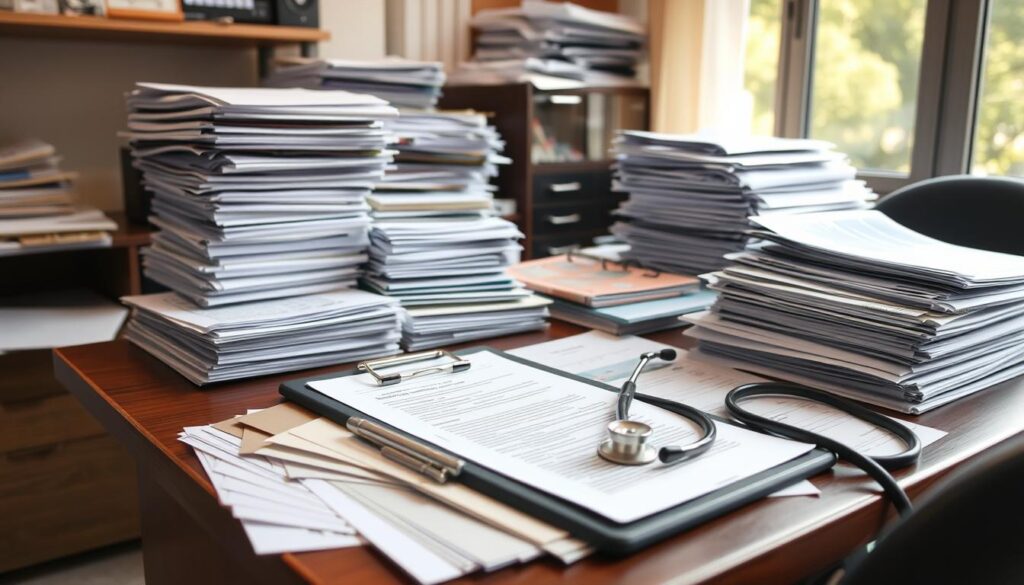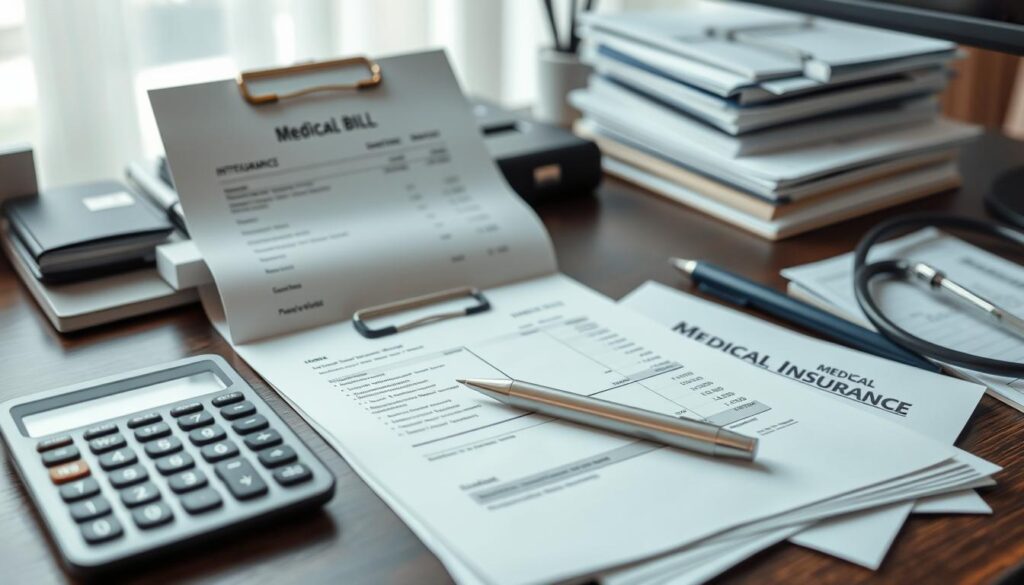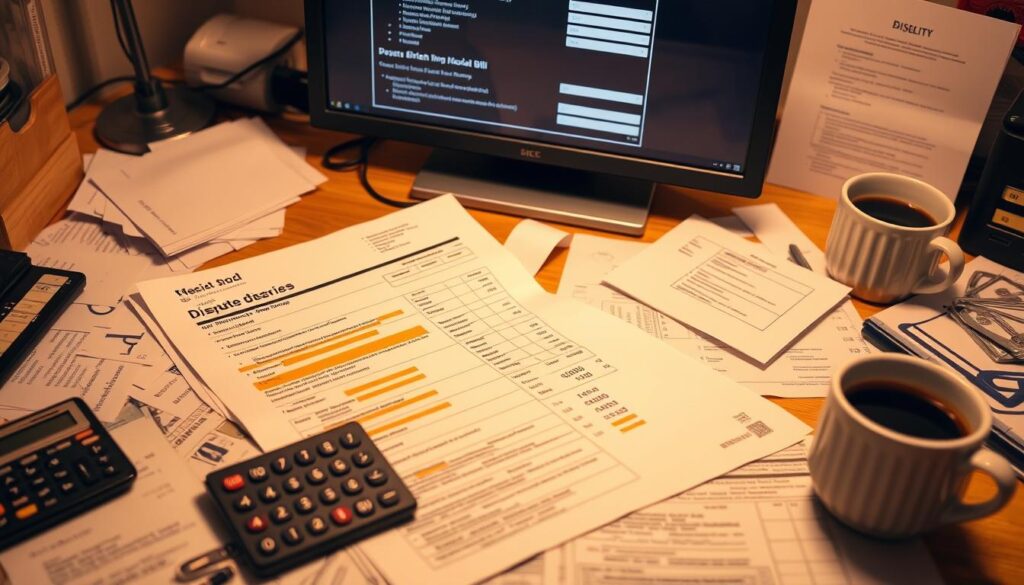Healthcare billing can be tricky. It’s important to check for overcharges or incorrect services. Medical bill disputes happen often.
Challenging wrong charges can save you money. It also ensures you get proper care. Understanding this process is key to avoiding financial troubles.
Key Takeaways
- Medical bill disputes help you avoid financial burdens and maintain accurate medical records.
- Common reasons for billing errors include coding mistakes and data entry errors.
- Gathering necessary documentation, such as medical records and billing statements, is crucial for an effective dispute letter.
- Crafting a clear and concise dispute letter with supporting evidence is key to a successful outcome.
- Persistently following up and appealing denied claims can help ensure a favorable resolution.
Understanding the Importance of Medical Bill Disputes
Healthcare billing can be complex and overwhelming. Addressing medical bill disputes is vital to avoid financial strain. It’s crucial to challenge erroneous charges to protect yourself from unfair fees.
Avoiding Financial Burden
Medical bills can quickly add up, especially without proper insurance. Disputing discrepancies in your bills can prevent costly errors. Successful disputes may lead to reduced costs or refunds.
In some cases, unjustified charges might be completely removed from your account. This can significantly lessen your financial stress.
Maintaining Accurate Medical Records
Precise medical records are crucial for healthcare management and bill disputes. Keep detailed notes of your treatments and associated costs. This documentation supports your claims and ensures an accurate medical history.
Taking control of your healthcare costs protects you from financial hardship. It also ensures you receive fair and accurate care. Understanding this process is key to safeguarding your health and finances.
| Benefit | Description |
|---|---|
| Reduced Costs | Successful medical bill disputes can lead to reduced or refunded charges, relieving the financial burden. |
| Accurate Records | Maintaining detailed medical records supports the dispute process and ensures the integrity of your healthcare history. |
| Empowerment | Taking an active role in disputing medical bills empowers patients to advocate for their healthcare rights. |
Addressing medical bill disputes is a crucial step in taking control of your healthcare costs and maintaining the integrity of your medical records.
Common Reasons for Medical Billing Errors
Healthcare billing is complex and often leads to errors. These mistakes can cause financial stress for patients. Understanding why they happen is key to fixing them.
Coding Mistakes
Improper coding is a major cause of billing errors. Healthcare providers use complex guidelines to represent services and procedures. Using wrong codes or missing modifiers can result in incorrect charges.
Data Entry Errors
Data entry mistakes are another common source of billing issues. Inaccurate patient info, treatment details, or insurance data can lead to wrong charges. These errors can happen at any stage of the billing process.
Knowing about coding mistakes and data entry errors helps patients spot healthcare billing problems. This knowledge empowers them to address medical billing errors effectively.
“Accurate medical billing is essential for maintaining the financial health of both patients and healthcare providers.”
Preparing to File a Medical Bill Dispute
Challenging medical bills can be tough. But with proper preparation, you can dispute inaccuracies effectively. Gather all needed documents and information before starting the appeals process.
Start by reviewing your medical records and billing statements. Check each charge carefully. Make sure services and costs match your treatment understanding. This helps identify errors that may justify a dispute.
Get copies of your medical records. Include diagnostic tests, procedure notes, and discharge summaries. These documents will support your case.
- Obtain copies of your medical records, including any diagnostic tests, procedure notes, and discharge summaries. These documents will provide the necessary evidence to support your case.
- Gather all your billing statements, including any Explanation of Benefits (EOB) documents from your insurance provider. Ensure you have a complete record of all charges and payments made.
- If you’ve had any prior conversations with your healthcare provider or insurance company regarding the disputed bill, document the details, including the date, the person you spoke with, and the outcome of the discussion.
Collect all billing statements and insurance EOBs. Keep a full record of charges and payments. Document any previous talks about the disputed bill.
With all documents ready, you can start the dispute process. Patient advocacy is crucial for protecting your rights. It ensures fair and accurate medical billing.
“Taking the time to thoroughly review your medical bills and records can make all the difference in resolving a dispute successfully.”
Gathering Necessary Documentation
Disputing a medical bill requires crucial documentation. You’ll need your medical records and billing statements to support your case. These documents provide essential information for your dispute.
Medical Records
Medical records detail the care you received and procedures performed. They explain the medical necessity behind the charges on your bill. Get a complete set of records, including test results and doctor’s notes.
These records help identify discrepancies in billing. They’re vital for spotting inaccuracies and supporting your case.
Billing Statements
Billing statements outline specific charges, codes, and account adjustments. Review these carefully to understand the cost breakdown. Look for potential errors like coding mistakes or data entry errors.
Organizing your medical records and billing statements creates a solid foundation. This preparation helps you build a strong medical bill dispute. It empowers you to advocate for your rights as a patient.

Crafting an Effective Medical Bill Dispute Letter
Challenging a medical bill can seem overwhelming. But with the right approach, you can navigate this process successfully. A well-crafted dispute letter is key to addressing inaccurate or unfair medical charges.
As a patient, you have the power to seek a fair resolution. Clear communication and solid evidence are crucial for an effective dispute letter.
Clear and Concise Language
Use simple, easy-to-understand language in your dispute letter. Avoid technical jargon that might confuse the reader. State the issue clearly, including the disputed amount and reasons for your challenge.
Present your case in a straightforward manner. This helps the recipient quickly grasp your concerns and respond appropriately.
Supporting Evidence
Include comprehensive supporting documentation with your letter. This may involve copies of medical records, detailed billing statements, and relevant communication records. Organize these documents logically to strengthen your case.
The more evidence you provide, the more convincing your argument becomes. This helps the reader understand your position better.
| Supporting Documentation | Purpose |
|---|---|
| Medical Records | Verify the services provided and their accuracy |
| Billing Statements | Identify any discrepancies or errors in the charges |
| Correspondence with Providers | Demonstrate your efforts to resolve the issue |
A well-written dispute letter combined with solid evidence can be powerful. It helps you advocate for your rights as a patient effectively. This approach increases your chances of reaching a fair resolution for your medical bill.
medical bill medical dispute letter
Drafting a strong medical bill dispute letter is crucial for success. This document outlines your issue to healthcare providers or insurance companies. It requests a resolution in a formal, persuasive manner.
A good letter requires careful planning and attention to detail. It should clearly state your case and support it with evidence. Your goal is to convince the recipient to act in your favor.
Clear and Concise Language
Start your letter by clearly stating the issue. Use simple language to explain your concern and need for resolution. Avoid complex legal terms or long sentences.
Specify the medical bill in question and the disputed amount. Clearly explain why you disagree with the charges. This helps the recipient understand your position quickly.
Supporting Evidence
Collect all documents that support your case. These may include medical records, billing statements, and previous correspondence. Organize these materials carefully for easy reference.
In your letter, explain how each piece of evidence supports your argument. This shows the inaccuracy or unfairness of the bill. Clear explanations strengthen your case significantly.
| Dispute Reason | Supporting Evidence |
|---|---|
| Coding Mistake | Medical records, coding guidelines |
| Data Entry Error | Billing statements, insurance claims |
| Incorrect Pricing | Comparison to standard rates, insurance contracts |
A well-organized case increases your chances of a favorable outcome. Present your evidence clearly and logically in your medical bill medical dispute letter. This approach makes your argument more compelling.

“Persistence and attention to detail are key when disputing a medical bill. Don’t be afraid to advocate for yourself and your rights as a patient.”
Submitting the Dispute Letter
Submitting a dispute letter is key to resolving medical bill issues. This letter outlines billing errors and requests corrections. A well-crafted letter boosts your chances of success.
Tracking and Follow-up
After submitting your letter, actively track your case’s progress. Follow up with the healthcare provider or insurance company regularly. This ensures your dispute isn’t overlooked and gets a timely response.
- Keep detailed records of all communication, including dates, contact information, and the substance of the conversations.
- Set reminders to follow up on the status of your dispute at regular intervals, such as every 2-3 weeks.
- If you encounter any delays or obstacles, don’t hesitate to escalate your case to a higher level of authority, such as a patient advocacy group or the relevant regulatory bodies.
Persistent follow-up is crucial in navigating complex medical billing disputes. Stay on top of your case to increase chances of a good outcome. Avoid unnecessary delays or denials through active management.
| Step | Action | Timeline |
|---|---|---|
| 1. Submitting the Dispute Letter | Send the dispute letter to the healthcare provider or insurance company | As soon as the dispute is identified |
| 2. Tracking the Dispute | Follow up with the provider or insurer to ensure the dispute is being processed | Every 2-3 weeks |
| 3. Escalating the Dispute | If necessary, escalate the dispute to a higher level of authority, such as a patient advocacy group or regulatory body | If no resolution is reached within 30-45 days |
Managing the dispute process actively is vital for a good outcome. Submit your initial letter promptly. Track and follow up diligently. These steps help resolve billing errors and avoid financial burdens.
Appealing Denied Claims
Patients often face frustration when their medical claims are denied. Appealing these denials can be a powerful tool for patient advocates. Understanding the appeal process helps you fight for the coverage you deserve.
Start by reviewing the reason for the denial. Was it a coding mistake, data entry error, or misunderstanding of your coverage? This information helps you build a strong case for your appeal.
Here’s how to appeal effectively:
- Gather all relevant medical records and billing statements to substantiate your claim.
- Craft a clear, concise appeal letter that outlines the reasons why the claim should be reconsidered.
- Submit the appeal within the specified timeline, ensuring you meet all deadlines.
- Follow up regularly to track the status of your appeal and be prepared to escalate the process if necessary.
Perseverance and attention to detail are crucial when appealing denied claims. A proactive approach and strong patient advocacy can increase your chances of securing needed healthcare coverage.
“Don’t let a denied claim discourage you. Persistence and a well-crafted appeal can make all the difference in the world.”
As healthcare costs rise, medical bill disputes and appeals become essential for patients. Understanding your rights helps you control your finances and ensure proper care.

Working with Patient Advocates
Medical billing disputes can overwhelm patients. Patient advocates offer valuable help in these situations. They know the healthcare system well and guide patients through tricky billing issues.
Navigating the Process
Patient advocates help with many tasks. They explain billing errors and talk to insurance companies and hospitals. These pros also gather needed papers and write strong dispute letters.
They keep track of case progress too. With their help, patients can handle disputes better. This reduces money worries and stress from complex billing problems.
- Understand the underlying reasons for the medical bill dispute
- Collect and organize relevant medical records and billing statements
- Craft a well-written and persuasive dispute letter
- Communicate with insurance companies and healthcare providers on the patient’s behalf
- Monitor the progress of the dispute and provide updates to the patient
- Offer guidance on next steps, such as appeals or negotiations
| Benefits of Working with a Patient Advocate | Potential Limitations |
|---|---|
|
|
Patient advocates boost confidence in medical bill disputes. They increase the chances of a good outcome. Their know-how helps patients tackle complex billing issues head-on.
Negotiating Medical Bills
Medical bills can be overwhelming, but there are ways to manage these costs. Patients can explore payment plans and financial assistance programs. These options offer alternative solutions to tackle high healthcare expenses.
Payment Plans
Many healthcare providers offer flexible payment plans for medical expenses. These plans allow for installment payments over time, making bills more manageable. Patients should ask about payment plan options to reduce their financial burden.
Financial Assistance Programs
Numerous programs help patients negotiate medical bills. Hospitals, government agencies, and nonprofits offer these programs. They can provide discounts, subsidies, or full coverage for eligible individuals based on financial status.
Patients should research these options to lower their healthcare costs. By using payment plans and assistance programs, patients can find budget-friendly solutions. This approach helps reduce financial strain and ensures access to necessary medical care.
| Payment Plan Options | Financial Assistance Programs |
|---|---|
|
|

“Negotiating medical bills can be a daunting task, but with the right strategies and resources, patients can find solutions to manage their healthcare costs.”
Protecting Your Rights as a Patient
Understanding your rights as a patient is vital when dealing with medical bill disputes. Your rights include accessing accurate records, disputing wrong bills, and advocating for fair treatment.
These rights are key to ensuring a positive healthcare experience. They empower you to take control of your medical expenses.
Know Your Patient Rights
Learn about these patient rights to empower yourself during medical bill disputes:
- The right to receive clear and detailed billing information
- The right to request a detailed explanation of charges and services
- The right to access your complete medical records
- The right to dispute any errors or discrepancies in your medical bills
- The right to seek assistance from patient advocates or financial counselors
Understanding these patient rights helps you advocate for yourself confidently. It also ensures healthcare providers are accountable for accurate healthcare billing.
Leverage Patient Advocacy Resources
Consider seeking support from patient advocacy organizations if you face challenges. These groups offer valuable guidance and patient advocacy assistance.
They can provide legal expertise to help you navigate the process. This support is crucial in protecting your rights.
“Patients have a right to understand their medical bills and to challenge any errors or discrepancies. Don’t be afraid to assert your patient rights and seek the help you need.”
Protecting your rights is crucial in addressing medical bill disputes. Stay informed and proactive to control your financial well-being.
This approach ensures you receive fair and transparent treatment. It’s your right to understand and manage your healthcare expenses.
Preventing Future Medical Billing Errors
Accurate medical billing is vital for patients and healthcare providers. Taking steps to prevent errors protects your finances and relationships with providers. Let’s explore two key strategies: careful review and open communication.
Careful Review
Reviewing medical bills is your first defense against errors. Scrutinize each item on your statements. Compare charges to services received. This approach helps spot discrepancies quickly.
By reviewing bills carefully, you can prevent medical billing errors. You’ll ensure you’re not paying for services you didn’t get.
Open Communication
Open communication with providers is another way to prevent medical billing errors. Ask questions about charges and voice your concerns. This fosters patient advocacy and leads to quick resolutions.
Talking with your healthcare billing team helps identify and fix errors promptly. It’s a powerful tool in managing your healthcare costs.
These strategies help you control your healthcare billing. They reduce the risk of future medical billing errors. Careful review and open communication protect your finances and provider relationships.
Conclusion
Managing medical bill disputes empowers patients to navigate the complex healthcare system. It helps safeguard their financial well-being. By understanding billing errors and gathering documents, patients can address discrepancies effectively.
Patient advocacy and open communication with providers are crucial. Engaging advocates and negotiating payment plans can ease unexpected medical expenses. Proactively addressing billing issues protects patient rights and maintains affordable healthcare.
Medical bill disputes go beyond resolving immediate financial concerns. They advocate for better healthcare practices and cost transparency. By taking an active role, patients can improve the healthcare system.
This process contributes to ensuring quality, affordable medical care for everyone. It’s an important step towards a more equitable healthcare landscape.

